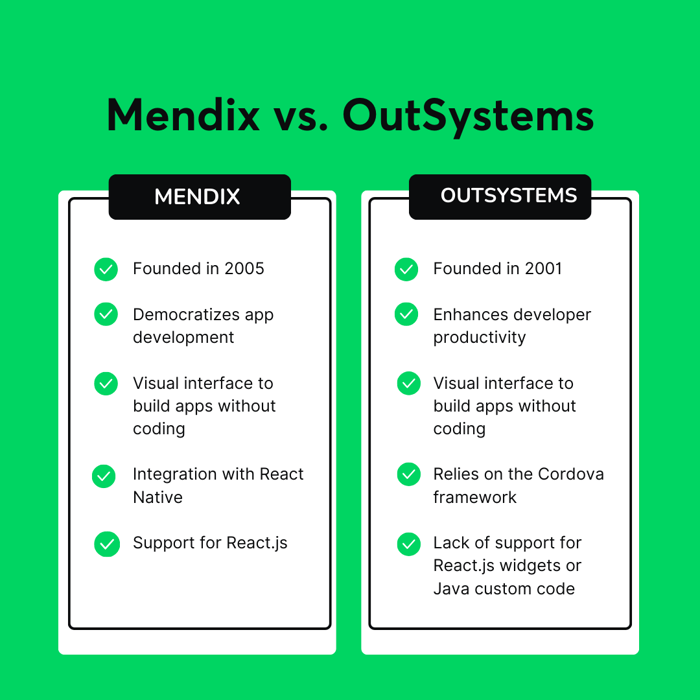The Battle of Mendix vs. OutSystems in Low-Code App Development

These factors, along with the exponential development of technology in general, have translated into the rise of a plethora of Low-Code Application Platforms (LCAPs). However, when it comes to enterprise-level solutions, only a few are typically listed by Gartner as leaders in the category.
Mendix and OutSystems have long been considered in the upper-right quadrant, offering robust low-code app development solutions. However, 2023 marks the first time Mendix has achieved the #1 position. In this article, we will delve into the differences between Mendix and OutSystems to help you make an informed decision for your enterprise.
Both Mendix and OutSystems have been listed multiple times in Gartner's Magic Quadrant for Low-Code Application Platforms. To make it easier to understand, Gartner divides its reports into four categories (Leaders, Challengers, Visionaries, and Niche Players) that are connected to two dimensions (Ability to Execute and Completeness of Vision).
Companies are then classified according to the following pattern: Leaders (high scores in Ability to Execute and Completeness of Vision), Challengers (High scores in Ability to Execute, Low scores in Completeness of Vision), Visionaries (Low scores in Ability to Execute, High scores in Completeness of Vision), and Niche Players (Low scores in Ability to Execute, Low scores in Completeness of Vision).
Since 2016, both Mendix and OutSystems have transitioned from the Visionaries category to the Leaders category, placing them alongside such players as Microsoft and Salesforce. Despite their similarities and general classification in the same category, their approaches to low-code development are completely different.
Learn the Differences: Mendix vs. OutSystems
Mendix, founded in 2005, is a comprehensive high-productivity software development platform that enables the full development cycle on a large scale: starting from ideation, through development, testing, and deployment, up to monitoring and control. You can learn more about Mendix's features by reading this article.
Mendix's philosophy centers around democratizing application development, aiming to bridge the gap between business and IT by empowering everyone as a maker. It offers an Integrated Development Environment, enabling simple development and integration with other software platforms and technologies.
OutSystems, founded in 2001, is an application development platform that, similarly to Mendix, offers low-code development capabilities. OutSystems has always been focused on enhancing developer productivity. From its early days, the company's primary goal has been to simplify and increase the efficiency of professional developers' work. The platform provides a massive range of advanced features to help developers deploy and manage their applications after development, such as built-in monitoring and analytics tools.
Evaluating the ease of use
When it comes to ease of use, both platforms have all the attributes that make them intuitive for developing rapid solutions at scale. Both OutSystems and Mendix have graphical models that allow developers to build user interfaces without coding.
Mendix provides users with an intuitive and flexible interface, making customization easier. It offers an intuitive drag-and-drop development environment, along with visual modeling and prototyping, facilitating rapid solution development. It has various team collaboration tools supported by Agile Workflows, which foster iterative development enhanced by integrated feedback and communication channels. These features are additionally enriched with ongoing DevOps support and streamlined version control.
OutSystems offers a very similar approach and tools to the philosophy of low-code software development. The UI, data model, and business logic of applications are built in a visual mode. Only parameters of certain actions may require simple and short pieces of code that represent calculations or queries. However, OutSystems does not offer tools that support the ideation phase or JIRA-like agile project management.
Mobile app development approaches
Mendix boasts a unique approach to mobile app development, particularly through its integration with React Native. This integration harnesses the power of React Native's open-source framework, enabling developers to create mobile, offline-first applications that not only offer native-like performance and user experiences but also benefit from a thriving community of developers and libraries.
Mendix's adoption of React Native extends its reach across a wide range of mobile devices and operating systems, providing flexibility and scalability for diverse project requirements. This approach simplifies the development process, as developers can leverage their existing knowledge of JavaScript and React to build cross-platform mobile apps, resulting in reduced development time and effort while ensuring top-notch performance.
On the other hand, OutSystems still relies on the Cordova framework, which is slowly fading away. Adobe announced the end of PhoneGap (from which Cordova originates) support in 2020. Additionally, two years ago, Microsoft announced that App Center would no longer offer the option to create Apache Cordova apps through the portal, CLI, or API. The reason for this is that Cordova was used in less than 1% of the projects. There is still no information on when OutSystems will migrate from the hybrid approach to something more robust. For now, apps based on Cordova are still functioning, as the framework is under active development by volunteers.
Extensibility and custom development
Developers have three options for extending the capabilities of Mendix applications:
- Using ready-made add-ons available in the marketplace.
- Deploying self-developed Mendix modules.
- Writing custom code.
The Mendix marketplace includes thousands of connectors, widgets, and services. You can connect with popular systems and services like SAP, ChatGPT, or Amazon without writing custom code and operating at the API level.
Regarding custom code, there are three separate areas to consider: frontend, backend, and mobile. For the frontend, Mendix supports the most popular framework, React.js. You can use one of the many UI widgets available on the market and plug it into your application or write one from scratch.
Backend actions can be written using another prevalent programming language, Java, and embedded into the application's source code. When you need to extend your native mobile application, you can use React Native or code natively for the particular platform—Android or iOS.
In contrast, OutSystems doesn't support React.js widgets or Java custom code but offers support for function-as-a-service (ODC) that can be written in C# using .NET libraries. As for the UI widgets, it's possible to create them using so-called "web blocks." OutSystems also offers a marketplace with more than 6,000 add-ons; however, currently, only fewer than 500 are compatible with the new ODC environment.
Documentation and learning
Mendix documentation is mature, regularly updated, and comprehensive. Mendix Academy is free for everyone and offers four different development paths: Rapid, Intermediate, Advanced, and Expert. It's easy to find detailed instructions for even less common use cases, such as performing scalable deployment to a private cloud, writing custom widgets, or building offline-first mobile applications.
In contrast, OutSystems, due to its recent pivot in the core architecture (transition from OutSystems 11 to ODC), suffers from a shortage of high-quality and up-to-date knowledge sources. Even though the OutSystems learning site offers a switch between O11 and ODC, no resources are available yet for ODC. Additionally, all the learning resources created by the community are no longer valid and need to be recreated.

Vendor lock-in and licensing
Mendix doesn't offer an option for deployment without an active license. However, in the case of an exit decision, clients have multiple options to maintain limited access to the application until the end of the transition process. One of them is changing the licensing model to minimize the cost. Another is to use unregistered software, which can operate normally but requires a restart every hour. If you decide to migrate your apps, leveraging the Model SDK (JS and TS) will provide access to the application model for a semi-automated approach.
On the other hand, OutSystems focuses on balancing code accessibility and vendor lock-in protection. What sets OutSystems apart is its ability to deploy applications without being tethered to an OutSystems license. This approach ensures application availability beyond license dependency, providing businesses with greater flexibility and control over their application ecosystem. Organizations using OutSystems can explore various deployment options while carefully considering the implications for business continuity, as they are not tied to a single licensing model. With this in mind, you should be aware that "detaching" OutSystems applications practically means exiting the platform, ceasing its further development and ability to provide maintenance.
Scalability
Mendix boasts superior scalability due to its "cloud-native" nature, which has allowed it to support Linux containers for a considerable period. This longstanding support for Linux containers has enabled Mendix to refine and optimize its containerization strategies over time, resulting in a well-established and robust solution for scalable application deployment.
In contrast, OutSystems introduced this capability in 2023 with the introduction of OutSystems Developer Cloud (ODC), marking it as a relatively recent addition to their offering. The comparatively shorter period of time that OutSystems has spent developing and fine-tuning its Linux container support implies that it may not have achieved the same level of maturity and reliability as Mendix's well-established solution.
It is worth pointing out that automatic migration from OutSystems 11 to OutSystems Developer Cloud is impossible. Existing clients need to start from scratch. This strategy marks a thick line in the OutSystems' continuity of software maintenance and implies a major inconvenience. Nonetheless, it was a necessary move for OutSystems to provide a true cloud-native experience based on Linux containers.
Integration potential
When it comes to integration potential, Mendix excels in seamless integration with existing systems thanks to its connectors and pre-built integrations. Developers have an extensive range of possibilities, including connection via REST API, SOAP API, ODBC, OData, and more.
With the recent introduction of Mendix 10, a new feature called Mendix Connect has been released to allow discovering and exploring data resources throughout their connected ecosystem. For advanced, enterprise-wide integrations, Mendix offers a separate component called Data Hub that provides a high level of governance and more accessible management in full-scale Mendix deployments. Integration capabilities make Mendix excel in blending into the enterprise IT landscape.
As a primary data storage, Mendix supports multiple databases like MariaDB, Microsoft SQL Server, Azure SQL, MySQL, Oracle Database, PostgreSQL, SAP HANA. Organizations that prefer private cloud deployment can use existing databases for cost optimization and better performance. OutSystems ODC, on the other hand, supports only Aurora PostgreSQL, while OutSystems 11 supports only Microsoft SQL Server and Oracle Database.
OutSystems, similar to Mendix, boasts an extensive library of connectors and adapters, simplifying data mapping and integration in complex environments. However, it does not offer a tool equivalent to Mendix Data Hub.
Choosing the right low-code for your business
In conclusion, selecting the right low-code platform for your enterprise is a critical decision. Both Mendix and OutSystems offer compelling features, but your choice should align with your organization's specific needs and goals.
The recent Gartner report reveals some customer reservations about OutSystems concerning two key areas: pricing and operations. Pricing concerns stem from the cost of licenses, which can hinder platform expansion or continued use for application development.
While OutSystems employs a pricing model based on Application Objects (AOs) to encourage reusability and address technical debt, clients who previously operated on unlimited licenses may encounter increased expenses under AO-based pricing. As a result, careful app sizing becomes necessary for budget planning.
In terms of operations, clients sometimes voice worries about the transition to a new deployment model, which may demand a shift in skills and effort. In rare cases, clients may find themselves needing to support both O11 and ODC, adding complexity to their operations. It's essential for organizations to weigh these reservations against Mendix's benefits when considering its adoption for their specific business needs. Also, ODC, with its current limitations, may force some new adapters to reach for OutSystems 11, risking a complete rewrite of applications in the future.
If you're looking for a native mobile experience, stability guaranteed by the Siemens brand, and more predictable licensing, go with Mendix. However, if you plan to deploy web applications detached from the low-code vendor, OutSystems might be a good option, although it is unclear whether so-called detaching will be possible in the new OutSystems ODC platform.








